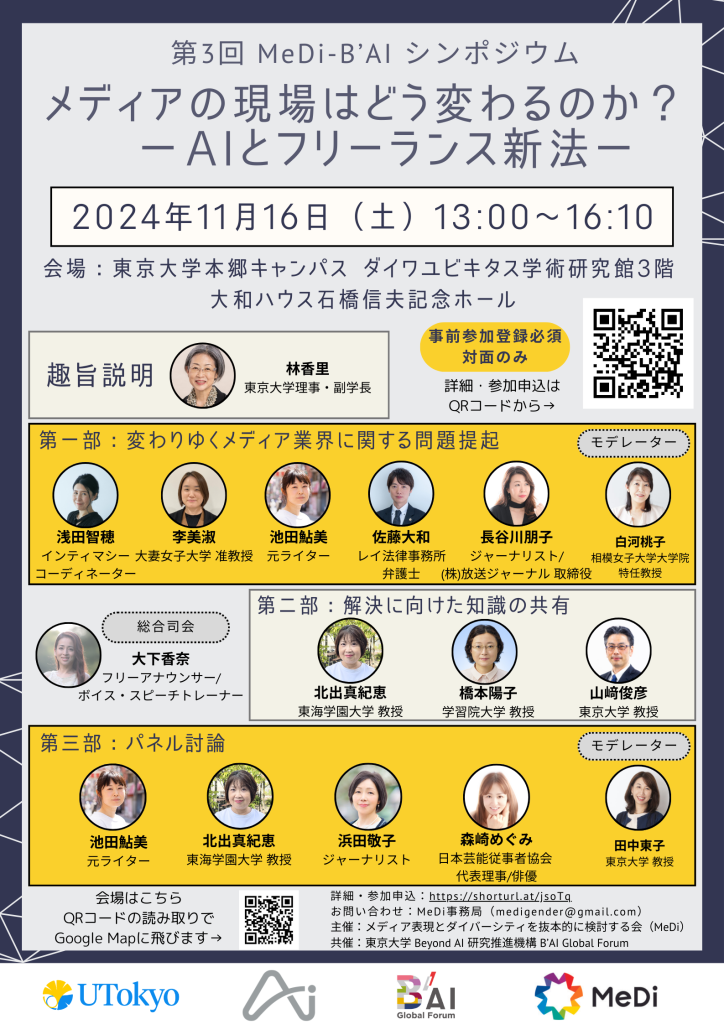2024.Oct.31
EVENTSThe 3rd MeDi-B’AI Symposium
“How Is the Media Landscape Changing? — AI and the Freelance Act”

Media and Diversity Forum (MeDi), established in May 2017 and became a subsidiary group of the B’AI Global Forum at the Institute for AI and Beyond, the University of Tokyo in 2020, has been engaged in a fundamental examination of media representation and diversity for the past seven years.
Together, MeDi and B’AI Global Forum will host a symposium titled “How Is the Media Landscape Changing? — AI and the Freelance Act” on November 16th, 2024. We welcome all those interested to join us. The details are as follows.
◇ Event Information
・Organizer: Media and Diversity Forum (MeDi)
・Co-organizer: B’AI Global Forum, Institute for AI and Beyond at the University of Tokyo
・Date: November 16, 2024 (Saturday), 13:00-16:10 (JST) (Doors open at 12:30)
・Format: On-site only
・Venue: Daiwa House Ishibashi Nobuo Memorial Hall, 3F, Daiwa Ubiquitous Computing Research Building, Hongo Campus, University of Tokyo
・Language: Japanese
・How to register: Please click on the link below for registration.
https://forms.gle/tAPa799svjcx2QkA7 (first-come, first-served, max 100 participants)
・Inquiry: medigender[a]gmail.com (Please change [at] to @)
*Please note that registration will close once capacity is reached.
*Please note that there may be changes to the presenters due to scheduling conflicts.
◇ Program
13:00-13:10 Opening Remarks (Kaori Hayashi, Executive Vice President, The University of Tokyo/MeDi member)
13:10-14:00 Part 1: Challenges in a Changing Media Industry
ー Chiho Asada (Intimacy Coordinator)
ー Ayumi Ikeda (Former Writer)
ー Yamato Sato (Lawyer)
ー Tomoko Hasegawa (Journalist/Director, HOSO JOURNAL CO., LTD)
ー Misook Lee (Associate Professor, Otsuma Women’s University/MeDi member)
ー Toko Shirakawa (Professor, Sagami Women’s University Graduate School/MeDi member)★Moderator
14:10-15:00 Part 2: Knowledge Sharing for Solutions
ー Makie Kitade (Professor, Tokai Gakuen University)
ー Yoko Hashimoto (Professor, Gakushuin University)
ー Toshihiko Yamasaki (Professor, The University of Tokyo)
15:10-16:10 Part 3: Panel Discussion
ー Ayumi Ikeda (Former Writer)
ー Makie Kitade (Professor, Tokai Gakuen University)
ー Megumi Morisaki (Actor/President, Arts Workers Japan Association)
ー Keiko Hamada (Journalist/MeDi member)
ー Tohko Tanaka (Professor, The University of Tokyo/MeDi member)★Moderator
For more details about the speakers/moderators, please visit the MeDi website: https://www.medi-gender.com/symposium-20241116/
◇ MeDi’s Position Statement on the Symposium
In prominent industries such as major publishing companies and TV broadcasters, which attract university students with their glamorous appeal, underlying issues have long persisted. These include overwork, harassment, opaque business practices, and hierarchical position/wage disparities resembling a class system. Often-invisible inequalities and injustices are now surfacing as significant problems, spurred by advocacy from those affected, legal reforms, and the growing presence of new technologies.
For instance, recent controversies such as the adaptation of Sexy Tanaka-san for television, which significantly altered the story from its original manga[i][ii], and the prolonged harassment of a female announcer—investigated by the Broadcasting Ethics & Program Improvement Organization (BPO), with a decision issued by The Committee for Broadcast and Human Rights, Decision No. 79 [iii][iv]— highlight a concerning trend. The impacts of these cases are particularly pronounced for freelancers, women, and other minorities in vulnerable positions. These incidents underscore a pervasive disregard within media corporations for respecting diversity as a foundational value in media culture, particularly for freelance workers whose rights and positions remain inadequately protected. Indeed, the persistence of homogeneous, inward-looking occupational cultures from the media’s golden age is still evident.
Additionally, the advent of generative AI technologies, such as ChatGPT, is beginning to transform the media industry. This shift, often driven by neoliberal values of productivity, automation, efficiency, and optimization, is reshaping various media sectors. The potential replacement of human labor by AI raises concerns about its effects on jobs, particularly for freelancers in creative fields, such as acting, announcing, writing, illustrating, designing, interpreting, and translating. Beyond the immediate impact of job displacement, the increasing presence of AI-generated models and representations poses additional concerns, such as the reproduction of stereotypical gender images.
In fields where individual talent and creativity should be highly valued—such as writing, acting, and voice work—workers face violations of their human rights, exploitation of their passion, and a looming threat of job displacement due to generative AI. What is occurring in the media production landscape? What challenges lie beneath the surface? At MeDi, we believe that the root causes of these issues include fundamental human rights violations, gender injustice, and hierarchical power dynamics, all of which may be hindering the development of Japanese media culture.
This symposium will focus on the new Freelance Act (Act on Ensuring Proper Transactions Involving Specified Entrusted Business Operators)[v], set to take effect in November 2024, and the issues surrounding generative AI. We invite participants to reconsider the human rights of those working in Japan’s media industry and the landscape of media culture. To what extent can the Freelance Act improve the current state of the media production workplace? Can we truly safeguard the human rights of minorities and vulnerable people and drive reforms in Japanese media culture? What is needed to harness AI technologies for building a more diverse, equitable, and inclusive society—one grounded in human rights rather than perpetuating existing power structures and values surrounding human labor?
By addressing topics such as workplace improvements, policy reforms, cultural preservation, and technology, we hope to foster discussion centered on the value of respect for diversity. Join us in reflecting on these critical issues.
[i] Shogakukan, “Announcement of Publication of Investigation Report by the Special Investigation Committee and Formulation of Guidelines for Visual Adaptations”
https://www.shogakukan.co.jp/news/476401
[ii] Nippon TV, “Results of the Investigation by the Internal Special Investigation Team on the Drama ‘Sexy Tanaka-san'”
https://www.ntv.co.jp/info/pressrelease/20240531.html
[iii] The Broadcasting Ethics & Program Improvement Organization (BPO), The Committee for Broadcast and Human Rights, Decision No. 79 of 2023, “Committee Decision on the ‘Allegation by Female Cast Member in Local Late-Night Programs'”
https://www.bpo.gr.jp/?p=11697
[iv] MeDi, “MeDi’s Position on BPO, The Committee for Broadcast and Human Rights, Decision No. 79, ‘Committee Decision on the Allegation by Female Cast Member in Local Late-Night Programs'”
https://www.medi-gender.com/bpo-humanrights/
[v] Japan Fair Trade Commission, Freelance Law Special Website
https://www.jftc.go.jp/freelancelaw_2024/